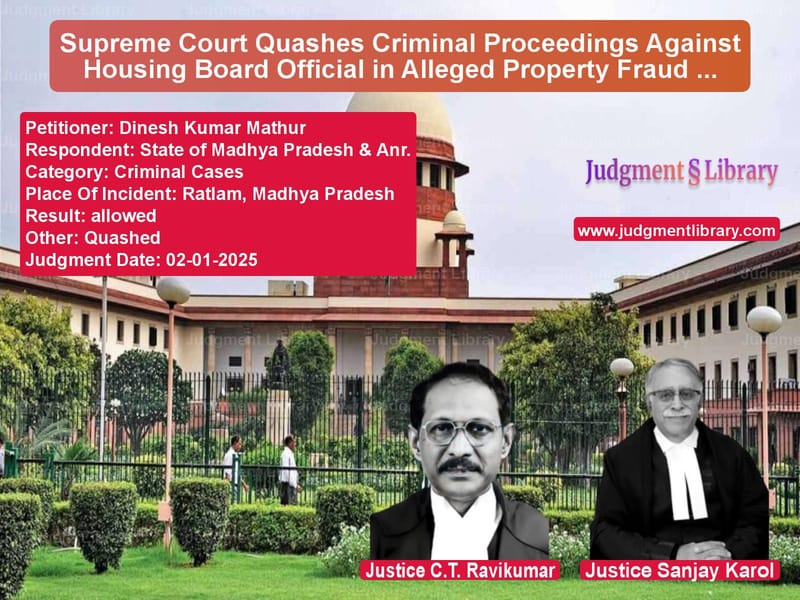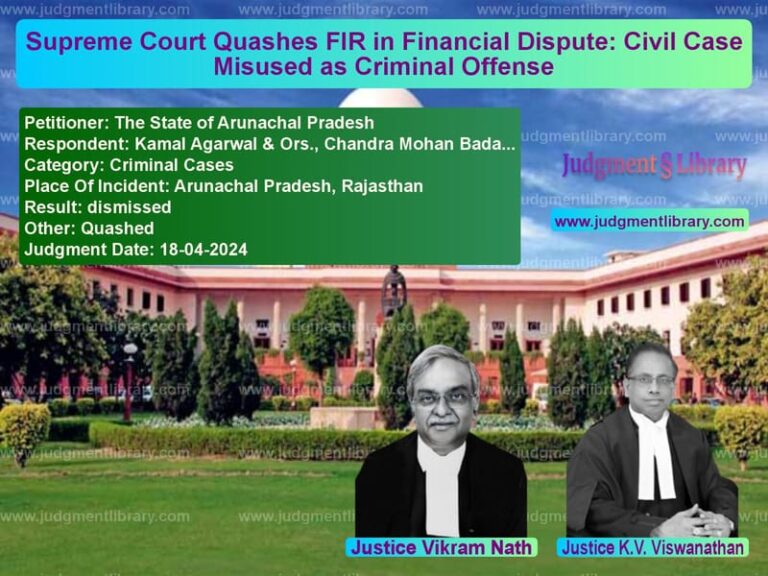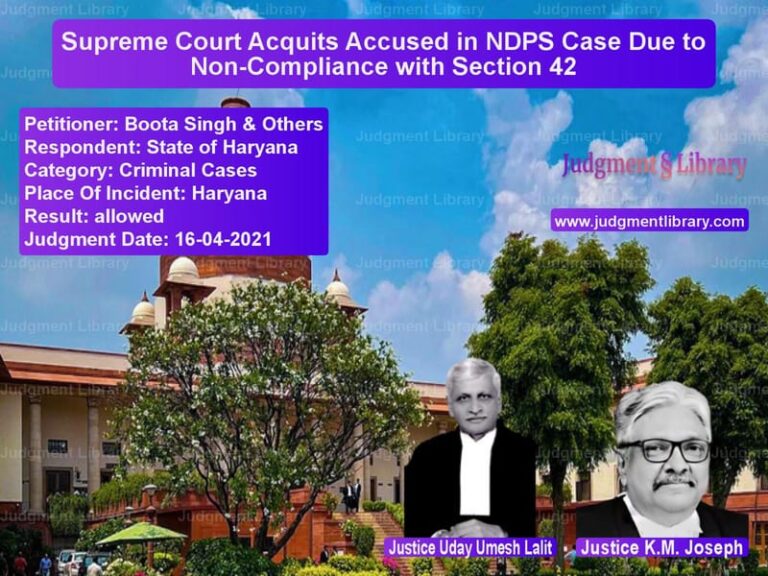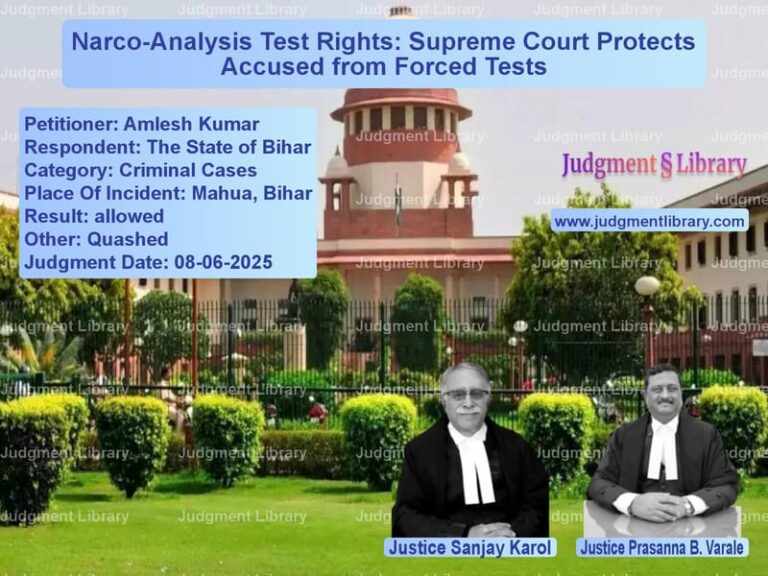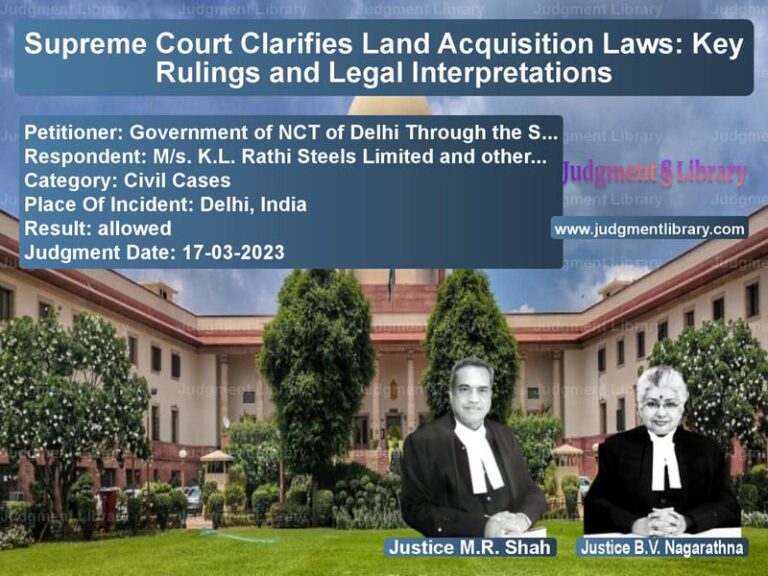Supreme Court Quashes Criminal Proceedings Against Housing Board Official in Alleged Property Fraud Case
The case of Dinesh Kumar Mathur vs. State of Madhya Pradesh & Anr. revolves around allegations of fraud and forgery in the transfer of a government-allotted property. The Supreme Court was tasked with determining whether a Housing Board official, who was accused of aiding the fraudulent sale of a property, had committed any cognizable offense warranting criminal proceedings.
The judgment is crucial in clarifying the role of government officials in property transactions and the applicability of criminal law when an act is performed under official duty.
Background of the Case
The case involved a property located at House No. D-90, Dindayal Nagar, Ratlam, which was originally allotted to one Gopaldas under a hire-purchase agreement with the Madhya Pradesh State Housing Board on January 10, 1991. Gopaldas allegedly transferred the property to Mangi Bai through an agreement to sell dated January 11, 1991. Subsequently, on December 17, 1994, Mangi Bai transferred the property to the complainant, Respondent No. 2.
The main allegations stem from an alleged fraudulent transfer of the property orchestrated by Ashok Dayya, who, in collusion with Housing Board officials, forged a Power of Attorney in his favor and registered the property under his name.
Charges Against the Appellant
The appellant, Dinesh Kumar Mathur, a Housing Board official, was accused of:
- Assisting in the illegal transfer of the property.
- Executing the sale deed without verifying the authenticity of the Power of Attorney.
- Being complicit in the fraudulent activities of Ashok Dayya.
Legal Proceedings
Filing of FIR
An FIR was registered on May 14, 2016, under Sections 419, 420, 467, 468, 471, and 120B of the Indian Penal Code (IPC), alleging conspiracy, forgery, and cheating. A chargesheet was later filed against:
- Ashok Dayya (A-1)
- Ramesh Chand (A-2)
- Nanalal (A-3)
- Krishna Singh (A-4)
- Dinesh Kumar Mathur (A-5)
High Court Proceedings
The appellant approached the Madhya Pradesh High Court, seeking to quash the criminal proceedings against him. However, the High Court dismissed his plea on April 28, 2017, stating:
“Prima facie involvement of the applicant in the crime appears from the charge-sheet and case diary statements of witnesses, so no question of quashing of FIR arises.”
Petitioner’s Arguments
The appellant’s counsel argued that:
- The execution of the sale deed was part of the appellant’s official duties and was done after obtaining legal opinion from the Housing Board’s counsel.
- The case was purely civil in nature and should not have resulted in criminal proceedings.
- The appellant was protected under Section 83 of the Madhya Pradesh Housing Board Act, 1972, which shields officials from prosecution for acts done in good faith.
- There was no mens rea (criminal intent) on the appellant’s part.
- Similar cases (M.Cr.C.No.374/2017 and M.Cr.C.No.3650/2017) had been decided in favor of the accused, and the FIRs were quashed.
Respondent’s Arguments
The State of Madhya Pradesh opposed the quashing of the FIR, arguing that:
- The appellant facilitated the fraudulent transfer of the property.
- The sale deed was executed based on a forged Power of Attorney, and the appellant failed to conduct due diligence.
- The criminal case should proceed to trial to establish the appellant’s role.
Supreme Court’s Analysis
Examining the Role of the Appellant
The Supreme Court scrutinized the appellant’s role and noted:
- There was no direct evidence that the appellant conspired with Ashok Dayya.
- The appellant merely executed the sale deed in an official capacity.
- The chargesheet did not establish intent to commit fraud.
Applicability of Section 83 of the Housing Board Act
The Court ruled that the appellant was protected under Section 83 of the Madhya Pradesh Housing Board Act, which states:
“No suit, prosecution, or other legal proceeding shall lie against the Board or its officers for anything done in good faith in pursuance of this Act.”
Verbatim Observations of the Court
The Supreme Court noted:
“There is no inkling in the slightest, apart from alleging connivance, to suggest that the appellant had played a role in dereliction of his duty.”
Application of Previous Judgments
The Court cited State of Haryana v. Bhajan Lal and ruled:
“Where the allegations in the FIR, even if taken at face value, do not constitute an offense, the FIR and criminal proceedings should be quashed.”
Final Judgment
The Supreme Court quashed the FIR and all related proceedings, ruling that:
- The charges against the appellant were not substantiated.
- The case was civil in nature and did not warrant criminal prosecution.
- The appellant was protected under Section 83 of the Madhya Pradesh Housing Board Act.
Conclusion
This judgment reinforces the principle that criminal proceedings should not be initiated in purely civil disputes. The ruling ensures that government officials are not unfairly targeted for actions performed in their official capacity.
Petitioner Name: Dinesh Kumar Mathur.Respondent Name: State of Madhya Pradesh & Anr..Judgment By: Justice C.T. Ravikumar, Justice Sanjay Karol.Place Of Incident: Ratlam, Madhya Pradesh.Judgment Date: 02-01-2025.
Don’t miss out on the full details! Download the complete judgment in PDF format below and gain valuable insights instantly!
Download Judgment: dinesh-kumar-mathur-vs-state-of-madhya-prad-supreme-court-of-india-judgment-dated-02-01-2025.pdf
Directly Download Judgment: Directly download this Judgment
See all petitions in Fraud and Forgery
See all petitions in Landlord-Tenant Disputes
See all petitions in Judgment by C.T. Ravikumar
See all petitions in Judgment by Sanjay Karol
See all petitions in allowed
See all petitions in Quashed
See all petitions in supreme court of India judgments January 2025
See all petitions in 2025 judgments
See all posts in Criminal Cases Category
See all allowed petitions in Criminal Cases Category
See all Dismissed petitions in Criminal Cases Category
See all partially allowed petitions in Criminal Cases Category

